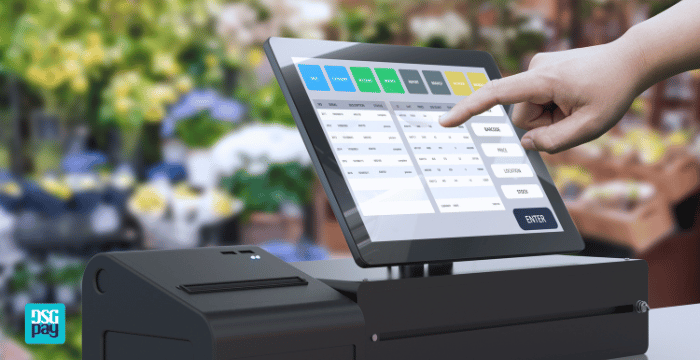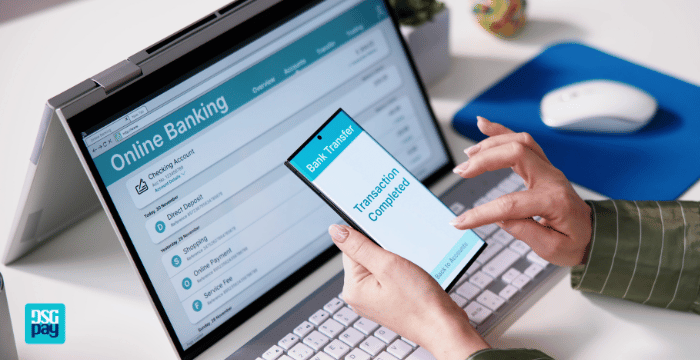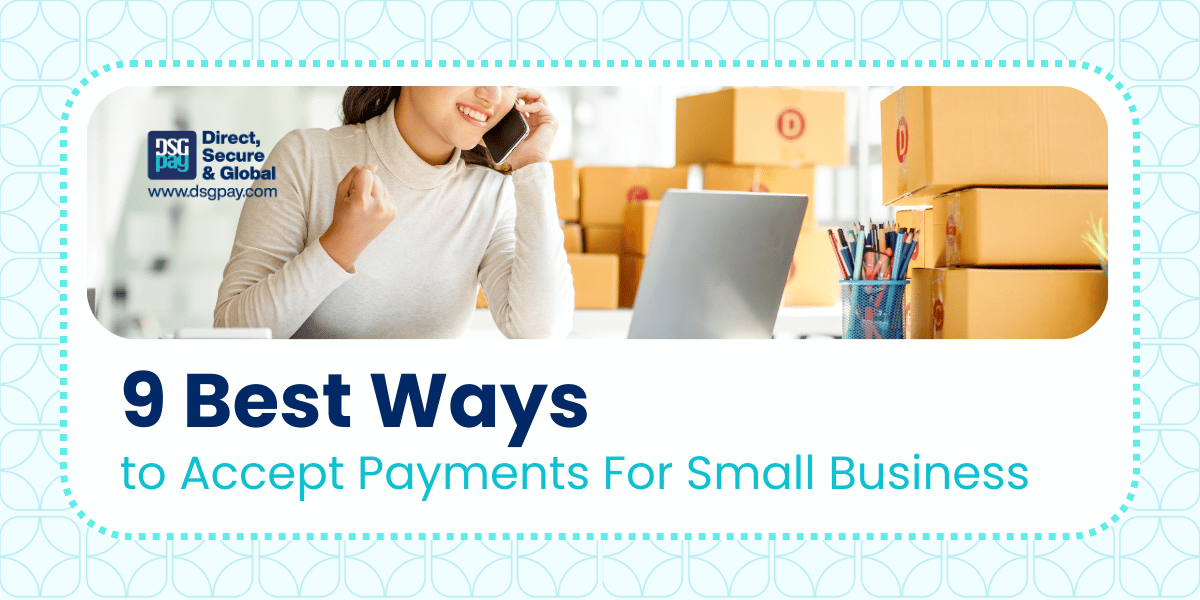Running a small business comes with enough challenges, and accepting payments shouldn’t be one of them. How you accept payments for small businesses can make all the difference between a smooth operation and a stressful day.
With countless options available today, we’ve compiled the top 9 ways to accept payments for small businesses that will help streamline transactions, enhance security, and ultimately drive growth for your company. Whether you’re selling in-store, online, or on the go, these solutions will ensure your business runs smoothly.
Table of Contents
Explore the Best Ways to Accept Payments for Small Business
1. Mobile Payments
Over the years, mobile payments have grown in popularity, with options like Apple Pay, Google Pay, and Samsung Pay making it easy to accept payments for small businesses and help customers make secure transactions directly from their smartphones, making it easier for customers to pay eliminating the need for cash or physical cards. In fact, according to Statista, global mobile payment revenues are projected to reach $1.3 trillion by 2023, highlighting the rapid adoption of mobile payment solutions worldwide.
By embracing mobile payments, you show customers that your business is modern, forward-thinking, and ready to meet their needs in an ever-evolving marketplace. As the digital payment landscape expands, companies that integrate mobile payment solutions will stand out from the competition and appeal to tech-savvy consumers who value speed and simplicity. Additionally, businesses that rely on accounts payable outsourcing services can streamline financial operations by integrating automated payment solutions, ensuring timely and accurate payments while reducing the risk of errors.
Pros:
- Convenience: Customers can make payments quickly with their smartphones.
- Security: These payments are encrypted, reducing the risk of fraud.
- Tech-Savvy Appeal: Attracts a younger, tech-focused demographic.
Cons:
- Limited Adoption: Not all customers use mobile wallets, so it might not be widely utilized.
- Setup Requirements: Integration with a mobile payment platform is needed, which can require additional technology.
- Transaction Fees: Similar to card payments, fees are associated with processing mobile payments.

2. Credit and Debit Cards
Credit card payments are a must-have for small business success, as credit and debit cards have been widely used among consumers for decades and will continue to be a preferred payment method for the foreseeable future. According to the Federal Reserve’s 2022 payments study, credit and debit cards accounted for 65% of all non-cash payments, demonstrating their continued dominance as preferred payment methods.
Customers value the convenience of paying by card, whether they’re shopping in-store or online. They are also great for small business owners’ accounting purposes. To set this up, you’ll need a merchant account and a payment gateway.
While credit and debit cards are easy and reliable, small business owners have to consider that they actually cost them a percentage of their earnings to the payment solution that issues the payment hardware and software. However, the advantages outweigh the drawbacks.
Pros:
- Widely Accepted: Most customers use credit and debit cards, increasing your sales potential.
- Quick Transactions: Payments are processed in real-time, ensuring a seamless checkout experience.
- Record Keeping: Transactions are easy to track for accounting and auditing purposes.
Cons:
- Transaction Fees: Credit and debit card payments incur fees, cutting into profit margins.
- Chargeback Risks: Fraud or disputes can lead to chargebacks, which are costly and time-consuming.
- Setup Costs: Requires a merchant account and payment gateway, adding upfront costs.
3. POS Systems
A Point of Sale (POS) system can do more than just accept payments from small business owners. It can track inventory, manage employees, and generate reports. Modern POS systems accept various payments, from cash to cards to mobile wallets. These systems are perfect for brick-and-mortar small business owners looking for an all-in-one payment solution.
Pros:
- All-in-One Solution: Manages inventory, employee records, and payments in one system.
- Multiple Payment Options: Accepts cash, card, and mobile payments.
- Streamlined Checkout: Fast, efficient payment processing in brick-and-mortar stores.
Cons:
- Expensive: POS systems can be costly to purchase and maintain.
- Training Required: Staff may need training to use the system effectively.
- Complexity: Can be overwhelming for small businesses with limited tech resources.

4. PayPal
PayPal is a trusted name in digital payments. It allows businesses to accept payments online or in person. With its widespread use and ease of integration into e-commerce platforms, PayPal is a great option for businesses with an online presence. PayPal offers features like invoicing, subscriptions, and the ability to send payments internationally, making it versatile for businesses of all sizes.
Pros:
- Trusted Platform: PayPal’s strong reputation builds customer trust.
- Global Reach: Can handle international payments easily, broadening your customer base.
- Easy Integration: Simple to add to most e-commerce platforms.
Cons:
- Not Universally Used: Some customers may prefer direct card payments over PayPal.
- High Transaction Fees: Especially for international transactions, PayPal fees can be higher than other options.
- Withdrawal Delays: Transferring funds to your bank account can take several days.
5. Bank Transfers
While not as immediate as card or mobile payments, bank transfers are a reliable and secure way to accept payments, especially for larger transactions that other payment channels are not convenient or safe for.
This includes services like Zelle, ACH payments, and wire transfers that allow you to transfer money directly between bank accounts. They often come with lower fees compared to card payments, making them one of the ideal ways to accept payments for small business owners dealing with high-ticket items or services.
Pros:
- Low Fees: Typically lower transaction fees compared to credit cards to accept payments for small businesses.
- Security: Direct bank transfers are secure, with minimal fraud risk.
- Good for Large Transactions: Ideal for high-ticket items or services.
Cons:
- Not Instant: Bank transfers can take days to clear, delaying cash flow.
- Manual Processes: Requires more effort to confirm and track payments.
- Limited Convenience: Not as quick or user-friendly as card or mobile payments.

6. Buy Now, Pay Later (BNPL)
Sure, you have probably heard of the Buy Now Pay Later option. Although it is not a widely used method to accept payments for small business owners, it has started to gain traction, particularly among e-commerce businesses. A report by Insider Intelligence revealed that 45% of online shoppers in the U.S. used Buy Now, Pay Later services in 2022, indicating significant consumer interest in flexible payment options.
This option, as the name states, allows customers to split payments into manageable instalments, making purchases feel more affordable. By offering BNPL options, your small business could see a reduction in cart abandonment and an increase in sales, as customers have the flexibility to spread out payments.
Pros:
- Increased Sales: Customers are more likely to buy when they can spread payments over time.
- Lower Cart Abandonment: Offering flexible payment options reduces cart abandonment rates.
- Appeals to Younger Audiences: Younger consumers tend to prefer BNPL options.
Cons:
- Delayed Payments: You may not receive the full payment upfront.
- Customer Debt Risk: If customers default, it can lead to bad debts.
- Higher Transaction Fees: BNPL services often charge higher fees to the business.
7. Online Payment Gateways
If you run a small business or own an online small-scale store, then using a payment gateway is a no-brainer. This channel allows customers to pay through your website using a variety of methods, including cards and digital wallets. Payment gateways secure sensitive customer data and ensure smooth transactions, building trust in your business over time. The ease that it offers makes shopping with your business easy.
Pros:
- Versatile: Supports multiple payment methods, increasing customer convenience.
- Secure: Protects sensitive customer data, reducing the risk of fraud.
- Automation: Streamlines transactions and reduces manual payment processing.
Cons:
- Setup Complexity: Requires integration with your website, which can be technical.
- Transaction Fees: Similar to credit card payments, fees apply.
- It is dependent on the internet: Transactions can be disrupted if there are connectivity issues.

8. Invoicing Software
For small business owners that operate on a service basis, invoicing software can be a game-changer. There are a lot of platforms that allow you to send digital invoices and receive payments directly through the invoice itself. These platforms often integrate with accounting systems, making it easier to not only accept payments for small businesses but also to track these payments and manage your books.
Pros:
- Efficient for Services: Ideal for businesses offering services rather than products.
- Automated Tracking: Integrates with accounting systems for easy tracking and reconciliation.
- Recurring Billing: Simplifies subscription services with recurring invoices.
Cons:
- Delayed Payments: Customers may take time to settle invoices, affecting cash flow.
- Software Fees: Subscription fees for invoicing software can add to operating costs.
- Not Ideal for Instant Payments: Slower compared to instant payment options like cards or mobile wallets.
9. Cryptocurrency
At this point, cryptocurrency payments are here to stay and are slowly becoming more mainstream ways to accept payments for small business owners. Even big businesses like Tesla have already started accepting Bitcoin and other digital currency payments. Exploring the option of crypto or digital currency payment opens up your business to new customers. With services like Coinbase, it is easy for small businesses to accept crypto payments. However, cryptocurrency has its drawbacks because it is not stable, so a lot of companies do not know how to peg it. However, since it opens up your business to a new customer base, it can offer you a unique advantage.
Pros:
- Innovative: Appeals to tech-savvy, forward-thinking customers.
- Global Transactions: Cryptocurrency payments work across borders without exchange fees.
- Low Fees: Compared to credit cards, crypto transaction fees are often lower.
Cons:
- Complexity: Setting up and managing cryptocurrency payments requires technical knowledge.
- Volatility: Cryptocurrency values can fluctuate, potentially affecting profit margins.
- Limited Adoption: Many customers still don’t use or trust cryptocurrency.
FAQs: Accept Payments for Small Business
Q: What is the best way to accept payments for a small business?
The best payment method depends on your business model and customer preferences. Mobile payments, credit/debit cards, and online payment gateways are popular choices due to their convenience and security.
Q: Are there fees associated with accepting digital payments?
Yes, most payment methods—such as credit cards, PayPal, and BNPL—charge transaction fees. These fees vary depending on the provider and payment method.
Q: How secure are mobile payments?
Mobile payments use encryption and tokenization, making them highly secure. However, businesses should ensure they use trusted payment providers. With DSGPay’s mobile application, small businesses can securely accept mobile payments, manage transactions on the go, and provide a seamless experience for customers.
Q: Can I accept international payments for my small business?
Yes, services like DSGPay allow small businesses to accept international payments in multiple currencies.
Q: How can DSGPay help simplify payments for my small business?
DSGPay offers secure virtual accounts, real-time transactions, and API integration, making it easier for small businesses to accept and manage payments across borders.
Simplify The Way You Accept Payments with DSGPay
With a better understanding of different options to accept payments, we want to highlight DSGPay, a cross-border payment solution that simplifies and accelerates your payment processing with ease and security.
DSGPay offers small businesses different virtual accounts, making it easy for you to receive payments from customers seamlessly. The platform offers real-time transactions and an API, ensuring fast, secure, and scalable payments for businesses of any size. With its reliability, you can maintain seamless operations and keep your customers happy, knowing that their transactions are secure.
We hope this guide has helped you better understand the different ways to accept payments for your small business, as well as how DSGPay can simplify and secure your transactions.
For more insights and helpful resources, be sure to explore our other blog posts on small business-related topics:



